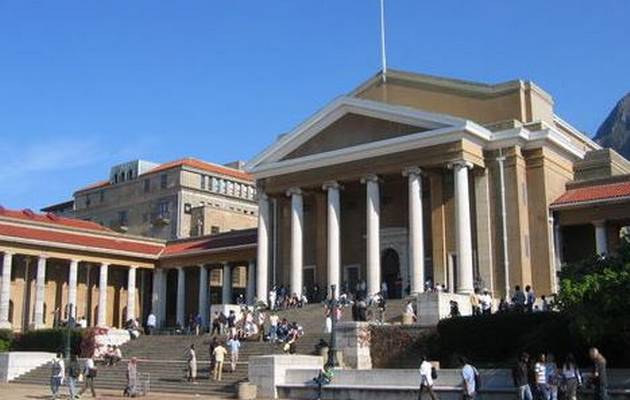
Image: UCT Student @UCTStudent via Twitter
‘We believe that higher education must play a key role in educating the public about good governance and sound economic practice, and in predicting and, if necessary, warning about the outcomes of policies and harmful practices. Universities also play a key role as a moral compass for society without being drawn into partisan conflicts over power.’
The University of Cape Town’s Vice Chancellor Max Price, former Chair of the Worldwide Universities Network, said he‚ together with senior leadership of the institution‚ believed that the country’s political system was facing its most serious crisis since 1994, and calls on all to commit to finding solutions to the current situation in South Africa.
This statement originally appeared on the UCT website on 11 April 2017 and has been quoted broadly and internationally.
Dear colleagues and students
Please find below a statement from the Senior Leadership Group of the University of Cape Town.
The Senior Leadership Group of the University of Cape Town (UCT) represents the collective leadership at UCT, which is made up of the Vice-Chancellor, Deputy Vice-Chancellors, Deans, Executive Directors and other senior leaders.
Although a diverse group with different opinions and politics, we are united in our view that our political system and economy are currently facing the most serious crisis since 1994 – a crisis that will eventually result in the most devastating consequences for the poor.
We are no longer confident that the State is acting in the best interests of society. The State of Capture Report by the highly respected Office of the Public Protector suggests that some in the State are illegitimately influenced by considerations of personal interest or enrichment of public officials, private businesses and foreign governments.
This ‘capture’ of state structures will lead to the devastation of our country. Aside from the economic and moral consequences of corruption itself, the consequent need by corrupt leaders to protect their access to state purses and to determine the flow of state resources has resulted in interference by certain powerful politicians and business interests in critical state structures, such as the South African Revenue Service, the National Prosecuting Authority, the “Hawks” and South African Police Service, the South African Broadcasting Corporation and, most recently, the National Treasury.
This has undermined the trust and confidence of large sections of the population in the leadership of our country. Corruption within state structures, furthermore, leads to the perversion of the very processes of democracy – the electoral systems and mechanisms through which government is held accountable.
We reiterate our commitment to that core value in section 1 of the 1997 Constitution of South Africa: that systems of public governance must strive for accountability, responsiveness and openness. All these values of public governance have been betrayed in recent years.
We believe that higher education must play a key role in educating the public about good governance and sound economic practice, and in predicting and, if necessary, warning about the outcomes of policies and harmful practices. Universities also play a key role as a moral compass for society without being drawn into partisan conflicts over power.
It is with this responsibility in mind that we call on all leaders in every sector in the country to respect and promote our constitutional values, to act in the best interests of all the people of this country, and to act against those leaders and officials embroiled in corruption so that we can restore the public’s respect for and trust in government institutions and democratic processes.
We encourage individual staff and students who support this call to become involved in finding solutions to these great challenges facing our country, and to exercise their rights and responsibilities as active citizens to bring about positive change.
Sincerely
Dr Max Price
Vice-Chancellor